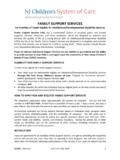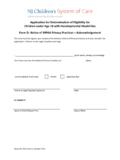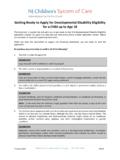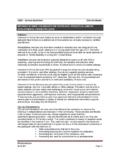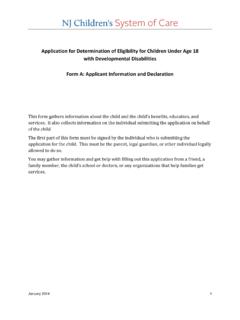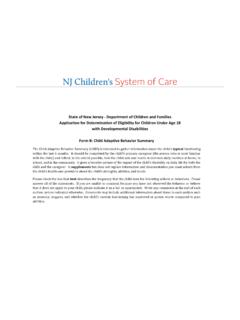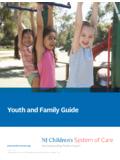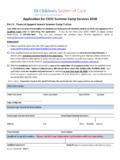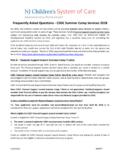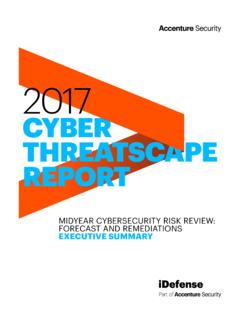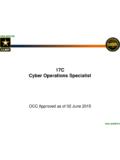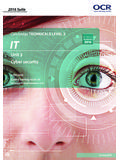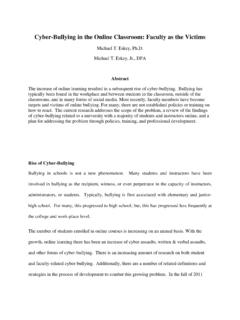Transcription of Individual Support Services (ISS) CYBER Process ...
1 00795 Individual Support Services (ISS) CYBER Process In June of 2015, there was an expansion of Intensive In-Home Services (IIH) to include Individual Support Services (ISS). This service was added to the existing array of in-home Services available to DD-eligible youth, along with Clinical & Therapeutic Services and Behavioral Services /Applied Behavior Analysis (ABA). ISS addresses adaptive behavior and skill development for activities of daily living (ADLs). ADLs include basic activities such as self-care skills, and instrumental skills, which will enable an Individual to live independently in the community. Basic ADLs include eating, toileting, hygiene, and dressing.
2 Instrumental ADLs include using a telephone, washing dishes, preparing a simple meal, changing bed linens, and the ability to manage money. The service intensity may range from 2-12 months, up to 10 hours per week. ISS teaches skills to the youth and educates the family in the implementation of the plan to Support the youth in gaining and implementing the new skills. To be eligible for ISS, the youth must be DD Eligible and enrolled in CMO or MRSS Services . The youth must also remain in CMO to maintain ISS, as ISS is not a stand-alone service. Basic ADL Services are for youth age 5 through 20, while Instrumental ADL Services are for youth age 16 through 20.
3 While ISS may be accessed as a step down from or as a precursor to ABA Behavioral Services , it MAY NOT be combined with ABA Behavioral Services simultaneously. ISS may be provided together with Clinical & Therapeutic Services . The ISS Treatment Plan is specifically for the use of those providers that are providing ISS, and must be submitted before continuing ISS Services can be requested by care management. The Behavioral Services /Behavioral Interventions (ABA) providers are to use the Functional Behavioral Assessment (FBA) and the Behavioral Support Plan (BSP). Please note: the IIH Treatment Plan is to be used only by providers of Clinical and Therapeutic Services .
4 The initial request for ISS is the same as the IIH Process , coming through a CMO or MRSS Treatment Plan (ISP or ICP); this will occur once the family has agreed to ISS. The plan is reviewed by PerformCare and, if deemed appropriate, an authorization for Services is created. The initial authorization for service code H2015HM is for the development of the initial plan and on-going assessment; continued Services are authorized with service code H2016 HAHA ( Individual Support Technician, BA/BS level) or H2015 HAHA ( Individual Support Technician, HS/GED level). The H2015HM authorization is created for 60 units over 90 days or the equivalent if the authorization is shorter.
5 The H2016 HAHO or H2015 HAHO authorization is created in conjunction with the H2015HM code, for 520 units over 90 days or the equivalent if the authorization is shorter. The ISS provider is expected to have the ISS Treatment Plan entered into CYBER within 10 business days after the start of the agency s Tracking Element. The revised, abridged Child Adaptive Behavior Summary (CABS) for ISS should also be completed and submitted to the MRSS or CMO directly. The CMO or MRSS uploads it directly into CYBER via the Doc Tab on the youth s face sheet. The revised, abridged 00795 CABS for ISS is located on the Provider Forms section of the PerformCare website: Since the CABS is not being uploaded by the ISS provider, the ISS provider is expected to enter a progress note into the youth s CYBER record, summarizing the findings of the CABS.
6 (This is not only for documentation purposes, but will also aid in transition for a youth who is working only with MRSS transitioning to a CMO.) Continued stay for ISS Services is requested on the ISP through CMO. The ISS provider is expected to submit a new ISS Treatment Plan and CABS every 90 days, prior to the end of the current authorization period. Before the continued stay request, the Child Family Team will review the ISS plan and updated CABS, to ensure the strengths, needs and strategies are identified appropriately and to Support the findings from the CABS. The updated CABS will be submitted to the CMO in the same manner as the initial CABS, and the CMO will upload it to the youth s record in CYBER .
7 PerformCare review staff will check that the ISS plan, progress note summarizing the CABS, and the CABS itself has been submitted and uploaded while reviewing the ISP. If there is no corresponding ISS Treatment Plan or recent CABS, PC will return the plan. The PC staff will review and approve the ISP and create the authorization for continued ISS Services . If you have any questions, please call PerformCare s Service Desk at 1-877-736-9176.
